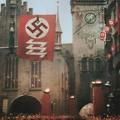
⚡⚡NSDAP was Pagan⚡⚡
🚩 Channel was restricted by Telegram
Show more- Subscribers
- Post coverage
- ER - engagement ratio
Data loading in progress...
Data loading in progress...
Carl Jung wrote an essay in 1936 that predicted the rise of fascism and the cataclysm of WWII. Jungian psychology is making a second appearance in our zeitgeist, especially with its popularization by Prof. Jordan Peterson of the University of Toronto. It is particularly important to understand Jung's theories because they speak to what sparks mass movements of great destructive power, and so give us clues about how to prevent that from happening. People interested in Jung's views on society and politics are encouraged to read this essay and several others which discuss the aftermath of the war, including "After the Catastrophe," "The Fight With the Shadow," and "The Undiscovered Self." The latter was published in 1956, and so it represents his mature and considered thoughts reflecting back on the rise of fascism, Nazism, the Holocaust, and the aftermath of WWII. All of these essays can be found in the volume of his works entitled "Civilization in Transition." The Undiscovered Self has also been published separately.
